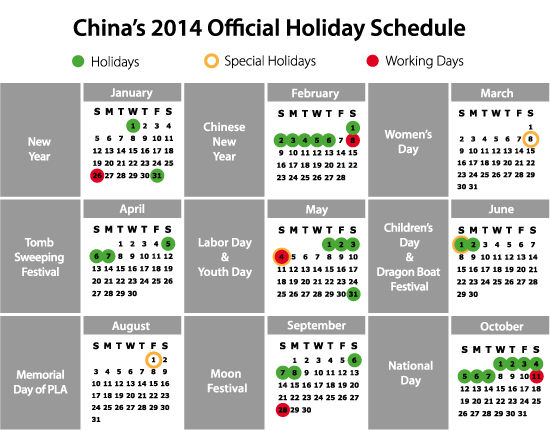China Announces Official 2014 National Holiday Schedule
Editor’s Note: You can find the updated National Holiday Schedule for 2015 here.
Dec. 12 – China’s General Office of the State Council released the “Circular on the Arrangement of Certain Holidays in 2014 (guobanfamingdian [2013] No.28)” on December 11 and announced the official national holiday schedule for 2014 as follows:
New Year
- January 1
Spring Festival
- January 31- February 6 (seven days in total)
- January 26 (Sunday) and February 8 (Saturday) are official working days
Tomb Sweeping Day
- April 5-7 (three days in total)
Labor Day
- May 1-3 (three days in total)
- May 4 (Sunday) is an official working day
Dragon Boat Festival
- May 31-June 2 (three days in total)
Mid-Autumn Festival
- September 6-8 (three days in total)
National Holiday
- October 1-7 (seven days in total)
- September 28 (Sunday) and October 11 (Saturday) are official working days
The State Council also released the “Decision on Revising the Measure of National Holidays and Memorial Days” on the same day, which adds some special holidays for certain groups of people, including women, youths, children, and soldiers. It will enter into effect on January 1, 2014.
The schedule of special holidays can be found below:
Women’s Day
- March 8: All women enjoy half-day leave
Youth Day
- May 4: Youths over 14 years old enjoy half-day leave
Children’s Day
- June 1: Children under 14 years old enjoy the whole day off
Memorial Day of the People’s Liberation Army of China
- August 1: Soldiers on active service enjoy half-day leave
It is important to note that the above dates are the officially recommended schedule, but private companies have the right to determine their own schedules as long as the following holiday dates are maintained.
New Year: January 1
Spring Festival: January 31- February 2
Tomb Sweeping Day: April 5
Labor Day: May 1
Dragon Boat Festival: May 31
Mid-Autumn Festival: September 8
National Holiday: October 1-3
According to the labor law of China, all employees working on one of the days above will enjoy triple salaries for time spent working on the national holidays.
Dezan Shira & Associates is a specialist foreign direct investment practice, providing corporate establishment, business advisory, tax advisory and compliance, accounting, payroll, due diligence and financial review services to multinationals investing in emerging Asia.
For further details or to contact the firm, please email china@dezshira.com, visit www.dezshira.com, or download the company brochure.
You can stay up to date with the latest business and investment trends across China by subscribing to The China Advantage, our complimentary update service featuring news, commentary, guides, and multimedia resources.
Related Reading
 An Introduction to Doing Business in China
An Introduction to Doing Business in China
Asia Briefing, in cooperation with its parent firm Dezan Shira & Associates, has just released this 40-page report introducing everything that a foreign investor should be familiar with when establishing and operating a business in China.
 Human Resources and Payroll in China (Third Edition)
Human Resources and Payroll in China (Third Edition)
A firm understanding of China’s laws and regulations related to human resources and payroll management is essential for foreign investors who want to establish or are already running foreign-invested entities in China. This guide aims to satisfy that information demand, while also serving as a valuable tool for local managers and HR professionals who may need to explain complex points of China’s labor policies in English.
 Social Insurance and Payroll
Social Insurance and Payroll
In this issue, we take a “back to basics” approach to China’s mandatory benefits. Where, exactly, is that extra 35-40 percent on top of an employee’s salary going? What are social insurance contribution rates, base amounts, and tax exemptions? How does all of this figure into the payroll process? We next look at mandatory benefits as a piece of the larger payroll puzzle, with highlights on two very China-specific pieces: FESCOs and hukou, China’s “domestic passport.”
China Announces Official 2013 National Holiday Schedule
Mandatory Social Welfare Benefits for Chinese Staff
China Labor Force Issues: Hepatitis B Virus and Infectious Diseases
Update: Foreigner Participation in China’s Social Insurance Scheme
A FESCO as a Tool for Labor Dispatch in China
- Previous Article China Clarifies Corporate Income Tax Policies for Shanghai Free Trade Zone
- Next Article China’s VAT Reform Creates Unequal Tax Treatment for Domestic and Foreign Shipping Companies










